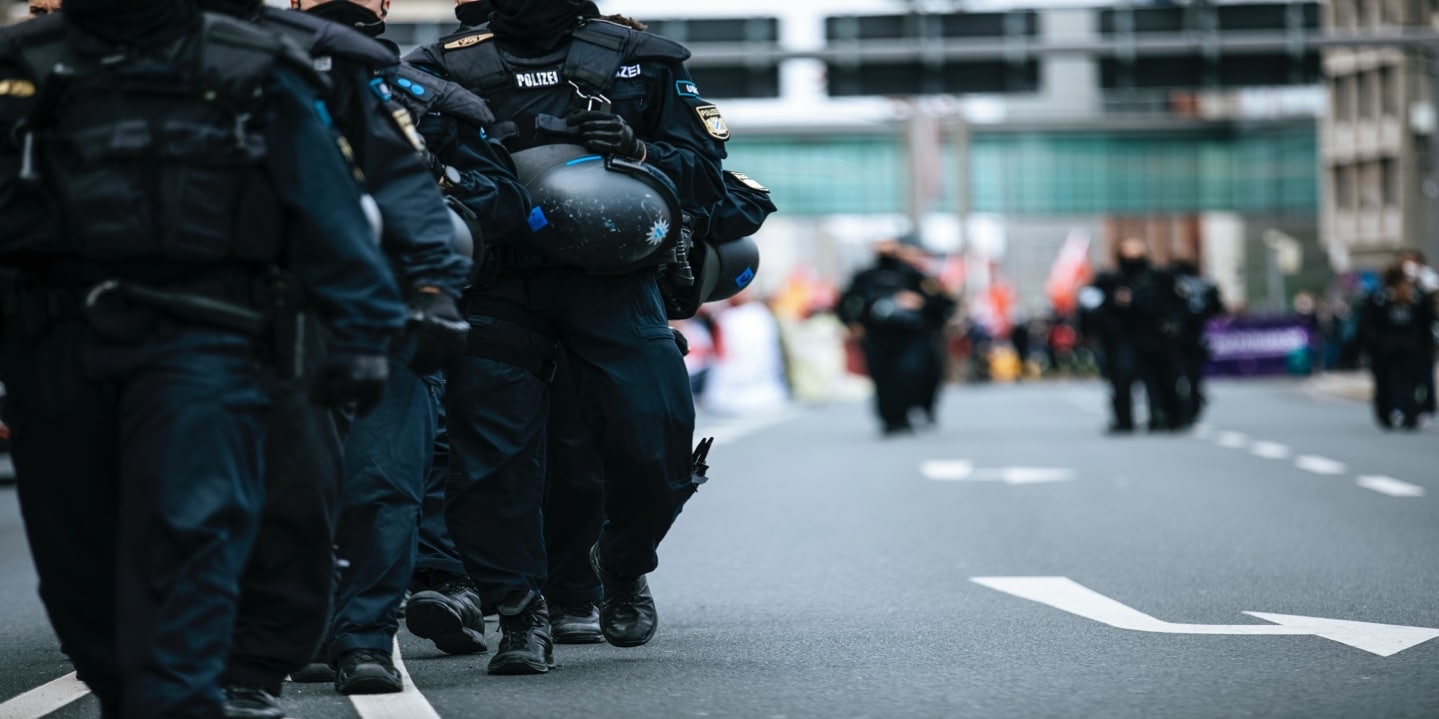Don’t Face A Federal Offense Alone, Consult Our Criminal Defense Attorneys Now!
If you’re under investigation by the FBI, the stakes are incredibly high. Federal charges come with severe penalties and can permanently alter your future. You need a skilled lawyer who focuses in federal criminal defense to help you through this complicated and often intimidating process.
At Cofer Luster Law Firm, PC, our lawyers have the expertise to defend you aggressively and are dedicated to achieving one of the best possible outcomes for your case. Don’t leave your future to chance. Call us now at (682) 777-3336 or contact us online for a consultation.
WE PROVIDE FREE CONSULTATIONS CALL US TODAY
About The FBI
When it comes to federal law enforcement, few agencies are as prominent or as widely discussed as the Federal Bureau of Investigation (FBI). The FBI plays a pivotal role in maintaining national security and investigating federal crimes. For someone who might be charged with a federal crime in Texas, it’s crucial to understand the agency’s scope, responsibilities, and strategy.
The FBI’s Mission And Core Priorities
The FBI’s overarching mission is to protect the American people and uphold the Constitution of the United States. They aim to accomplish this through a series of mission priorities:
Terrorism
The FBI is tasked with protecting the U.S. from the threat of terrorism. This involves investigating, thwarting, and prosecuting acts of terrorism.
Counterintelligence
The Bureau also works to safeguard the nation from foreign intelligence and espionage activities, as well as cyber threats.
Cyber Crime
Another priority for the FBI is to tackle significant cyber criminal activities. This ranges from hacking to online fraud.
Public Corruption
The FBI aims to fight public corruption at all levels, ensuring that government agencies and officials maintain integrity.
Civil Rights
The agency works to protect citizens’ civil rights, investigating instances where these rights may be violated.
Organized Crime
Combatting transnational criminal enterprises is also within the FBI’s mandate. This includes tackling drug trafficking, smuggling, and other organized criminal activities.
White-Collar Crime
The FBI focuses on prosecuting significant white-collar crimes such as fraud, embezzlement, and insider trading.
Violent Crime
Lastly, the Bureau is committed to combating significant violent crimes, which could include homicides, robberies, and assaults.
Operational Reach: Where The FBI Operates
The FBI has a wide operational reach, both nationally and internationally:
- Their headquarters is located in Washington, D.C.
- They have 56 field offices across the U.S., along with around 350 satellite offices called resident agencies.
- Internationally, they maintain more than 60 offices, known as legal attachés, in U.S. embassies worldwide.
Workforce And Budget
Employing over 35,000 people, the FBI’s team includes special agents and support professionals, including intelligence analysts, language specialists, and IT experts. For the fiscal year of 2023, they have a direct-funded budget of approximately $10.8 billion.

Terrorism
What Is Terrorism?
The FBI broadly categorizes terrorism into two main types: international terrorism and domestic terrorism.
International Terrorism
Involves violent, criminal acts committed by individuals or groups who are inspired by or associated with foreign terrorist organizations or nations. This kind of terrorism usually aims to harm U.S. citizens or interests, both domestically and abroad.
Domestic Terrorism
Involves violent, criminal acts committed by individuals or groups seeking to further ideological goals stemming from influences within the United States. These influences can be political, religious, social, racial, or environmental.
Both of these definitions align with federal laws, particularly under Title 18 of the United States Code, Section 2331, which provides the legal foundation for identifying and prosecuting acts of terrorism.
The Role Of The FBI And Joint Terrorism Task Forces
The FBI is the lead federal agency in the U.S. for investigating terrorism. Its number one priority is to protect the United States from terrorist attacks.
The Evolving Threat Landscape
The terrorism threat landscape has changed significantly since the September 11, 2001, attacks. It now involves various factors such as:
Lone Offenders
Terrorist threats have shifted from large-group conspiracies to lone offenders. These individuals often radicalize online and may act without direct affiliation or guidance from larger groups, making them difficult to identify and stop.
Online Radicalization
Social media and the internet have become significant tools for international and domestic extremists to spread their ideologies. Groups like the Islamic State of Iraq and ash-Sham (ISIS) have effectively used these platforms to recruit supporters and inspire attacks.
Cyber Crimes
The FBI’s Role In Cybersecurity
The Federal Bureau of Investigation (FBI) serves as the leading federal agency responsible for investigating cyber attacks and intrusions.
Federal Laws In Play
Various federal laws give the FBI the authority to prosecute cybercrime. Some of these laws include the Computer Fraud and Abuse Act (CFAA), 18 U.S.C. § 1030, which makes it illegal to gain unauthorized access to a computer or a network. Another critical statute is the Electronic Communications Privacy Act (ECPA), 18 U.S.C. §§ 2510-2522, which protects against unlawful interception of electronic communications.
Counterintelligence

What Is Counterintelligence?
Counterintelligence refers to the collection of activities aimed at protecting a nation’s intelligence and sensitive information from foreign and domestic threats. This often involves countering espionage, sabotage, and other covert activities that may compromise national security.
The FBI’s Role In Counterintelligence
The FBI serves as the primary federal agency responsible for counterintelligence activities in the United States. With a focus on both traditional spying and cyber-espionage, the FBI aims to protect the country’s most sensitive information across various sectors.
Key Objectives Of The FBI’s Counterintelligence Program
Safeguarding U.S. Intelligence Secrets
The FBI works diligently to protect the classified and sensitive information that belongs to the U.S. Intelligence Community.
Defending Critical National Assets
Whether it’s technological advances, defense strategies, or economic plans, the FBI aims to protect information that is crucial to the country’s well-being.
Countering Foreign Spies
One of the main objectives is to neutralize the activities of foreign agents and spies who are trying to collect intelligence on U.S. activities.
Preventing WMDs From Reaching The Wrong Hands
The FBI also endeavors to prevent the proliferation of weapons of mass destruction by keeping them out of the hands of terrorists and other enemies of the state.
The Federal Laws Concerning Counterintelligence
Under U.S. Federal Law, activities such as espionage and unauthorized data collection are primarily governed by the Espionage Act of 1917 (18 U.S.C. Chapter 37). This law criminalizes the act of spying, the unauthorized disclosure of national defense information, and other related activities that pose a risk to national security.
Economic Espionage: A Growing Concern
Economic espionage is a specific type of spying that targets economic intelligence, often in advanced technologies and thriving U.S. industries. Federal laws like the Economic Espionage Act of 1996 (18 U.S.C. Chapter 90) address this form of intelligence gathering and criminalize the unauthorized possession, duplication, or distribution of trade secrets.
Organized Crime
What Is Transnational Organized Crime?
Transnational organized crime refers to criminal organizations that operate internationally, often employing sophisticated methods and technologies to further their illegal activities. These groups can vary in structure—ranging from hierarchical organizations to networks and cells—and primarily aim to generate profits through criminal means. Activities commonly associated with TOCs include drug trafficking, human smuggling, money laundering, and various forms of fraud, among others.
The Legal Framework: RICO Act
The Racketeer Influenced and Corrupt Organizations Act, commonly known as RICO, is a federal law designed to combat organized crime in the United States. Enacted in 1970, RICO provides for both criminal penalties and a civil cause of action for acts performed as part of an ongoing criminal enterprise. The act focuses on racketeering and allows the leaders of a syndicate to be tried for the crimes they ordered others to commit.
Violent Crimes

The FBI’s Prioritization Of Violent Crime
Despite its significant role in national security, the FBI has been instrumental in combating various forms of violent crime. The agency focuses on criminal activities that have a broad societal impact. This includes instances like mass killings, sniper murders, and serial killings.
Types Of Violent Crime Investigated By The FBI
Gangs
Gang violence is a critical concern for the FBI. Approximately 33,000 violent street gangs, motorcycle gangs, and prison gangs exist across the country. These gangs have around 1.4 million members and are responsible for a large portion of violent crimes. Federal laws such as the Racketeer Influenced and Corrupt Organizations Act (RICO) are often applied in these cases.
Violent Crimes Against Children
The FBI continues to be active in solving crimes against children. This could range from abduction to sexual exploitation. The Adam Walsh Child Protection and Safety Act of 2006 is a key federal law that supports the FBI’s jurisdiction in these matters.
Indian Country Crime
Crimes that happen in Native American territories also fall under the FBI’s jurisdiction. Federal laws like the Major Crimes Act specify which offenses are under federal jurisdiction if committed within Indian Country.
Involuntary Servitude And Human Trafficking
Human trafficking investigations are another focus area for the FBI. Victims are often induced into forced labor or commercial sex acts. The Victims of Trafficking and Violence Protection Act of 2000 is a major federal law that deals with human trafficking.
Bank Robbery
The FBI has been involved in bank robbery investigations since the 1930s. The Federal Bank Robbery and Incidental Crimes Statute makes it a federal offense to rob a bank and brings these cases under the FBI’s jurisdiction.
Art Crime, Jewelry And Gem Theft
Crimes involving stolen art and cultural property, as well as theft of jewelry and gems, are also investigated by the FBI. Laws like the National Stolen Property Act can be applied in these cases.
International Violent Crimes
The FBI also has the authority to investigate violent crimes committed against Americans overseas. This could include crimes like non-terrorism related hostage-takings, kidnappings, or violent acts against U.S. nationals.
White-Collar Crimes
The Federal Bureau Of Investigation (FBI) And Its Role
The FBI plays a pivotal role in the investigation and prosecution of white-collar crimes. Their scope of investigation can be regional, national, and even international. Focused units within the FBI work in tandem with other federal agencies like the Securities and Exchange Commission (SEC), the Internal Revenue Service (IRS), the U.S. Postal Inspection Service, and the Treasury Department’s Financial Crimes Enforcement Network (FinCEN).
Types Of White-Collar Crimes And Federal Laws
Health Care Fraud
One of the common types of white-collar crimes is health care fraud, which affects both individuals and businesses. This involves deceptive practices to unlawfully gain benefits or payments from health care programs. The FBI is the main agency that investigates health care fraud. This falls under the jurisdiction of the False Claims Act (31 U.S.C. §§ 3729–3733), which makes it illegal to submit claims for payment to Medicare or Medicaid that someone knows or should know are false or fraudulent.
Corporate Fraud
The FBI also focuses heavily on corporate fraud, particularly those that involve accounting schemes and obstruction of justice. These crimes often involve the falsification of financial information, insider trading, and other fraudulent activities to deceive shareholders and regulatory agencies. Violations often fall under the Sarbanes-Oxley Act of 2002, which mandates accurate financial reporting by corporations.
Money Laundering
Money laundering involves making “dirty” money appear clean and originates from various criminal activities such as human trafficking or drug trade. Federal law criminalizes money laundering under 18 U.S.C. § 1956, which prohibits the illegal handling of proceeds generated from specified unlawful activities.
Securities And Commodities Fraud
With the increasing complexity of investment vehicles, securities and commodities fraud has become more prevalent. These involve deceptive practices in the stock and commodities markets and are often investigated in conjunction with the SEC. The main law governing these activities is the Securities Exchange Act of 1934.
Mortgage And Financial Institution Fraud
Financial institution fraud targets banks and other financial entities and is often coupled with mortgage fraud. Laws that often apply include 18 U.S.C. § 1344, which makes it a crime to defraud a financial institution, and the Bank Secrecy Act, which requires financial institutions to keep certain records and file certain reports that may be helpful to detect and prevent money laundering and other financial crimes.
Intellectual Property Theft/Piracy
The theft of intellectual property, including trade secrets and copyrighted materials, is another form of white-collar crime. The main laws that govern these crimes are the Copyright Act of 1976 and the Economic Espionage Act of 1996.
Civil Rights Offenses: A Closer Look
The Role Of The FBI In Civil Rights Offenses
The Federal Bureau of Investigation (FBI) takes the lead in enforcing federal civil rights laws. They are tasked with investigating various types of civil rights offenses, including hate crimes, abuses under the color of law, human trafficking, and involuntary servitude, as well as violations of free access to clinical entrances. Hate crimes are generally prosecuted under 18 U.S.C. § 249, while color of law abuses fall under 18 U.S.C. § 242. Involuntary servitude and human trafficking offenses are typically investigated and prosecuted under the Trafficking Victims Protection Act (22 U.S.C. § 7102).
Public Corruption: An FBI Focus
Public corruption remains an important criminal investigative focus of the FBI. This broad category encompasses various types of offenses, including but not limited to election crimes, international corruption, border corruption, and prison corruption. Public corruption is usually prosecuted under federal statutes such as the Hobbs Act (18 U.S.C. § 1951), the Federal Corrupt Practices Act, and the Foreign Corrupt Practices Act (15 U.S.C. §§ 78dd-1). Election crimes may fall under the jurisdiction of the Federal Election Campaign Act (FECA).
WE PROVIDE FREE CONSULTATIONS CALL US TODAY

FBI’s Role In Intelligence Gathering
The Importance Of Intelligence In The FBI’s Mission
The FBI relies heavily on intelligence to fulfill its mission. The techniques used to gather intelligence have evolved over time to combat emerging threats, both domestic and international. Methods often include interviews, wiretaps, and sophisticated data analysis techniques.
Complying With Privacy Laws And Civil Liberties
Governing Rules
When gathering intelligence, the FBI is bound by a range of laws and procedures designed to protect American citizens’ privacy and civil liberties. These include:
- The Attorney General’s guidelines
- Procedures for national security investigations and foreign intelligence collection
- The U.S. Constitution
- Federal laws
- Established criminal procedures
- Authorities as mandated by U.S. courts
Foreign Intelligence Surveillance Act (FISA) And Section 702
One of the key federal laws governing the FBI’s intelligence activities is the Foreign Intelligence Surveillance Act (FISA) of 1978. FISA provides a legal framework for conducting physical and electronic surveillance for foreign intelligence purposes. A specific section of FISA, known as Section 702, allows for the targeting of non-U.S. persons reasonably believed to be located outside the U.S.
Sharing Of Intelligence
Intelligence Community Involvement
The FBI is part of the United States Intelligence Community (IC), which consists of 17 federal agencies responsible for intelligence gathering. The FBI not only uses intelligence for its internal investigations but also shares relevant information with other IC members.
Cooperation With Law Enforcement Agencies
Beyond the Intelligence Community, the FBI collaborates with various other law enforcement agencies at the federal, state, local, and tribal levels.
Engagement With The Private Sector
Through its Office of Private Sector, the FBI regularly shares intelligence information with U.S. businesses and educational institutions.
Secure Your Future With A Cofer Luster Federal Defense Attorney
Being under FBI investigation is an urgent matter that requires immediate action. The government will have an entire team working against you; shouldn’t you have a dedicated lawyer fighting for you? At Cofer Luster Law Firm, PC, we focus in federal criminal defense and are committed to protecting your rights and freedom. Every minute counts, so don’t delay. Reach out to us at (682) 777-3336 or visit us online to set up a consultation. Let us help you mount the strong defense you need.
To learn more about defending against federal charges, click here.


